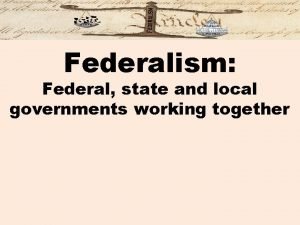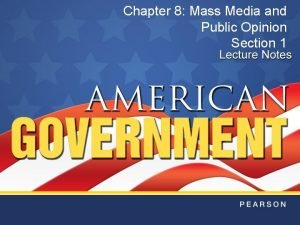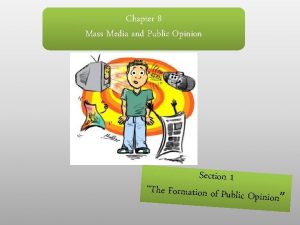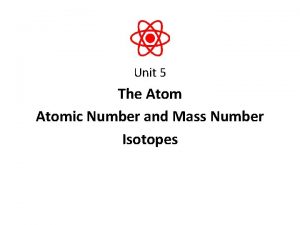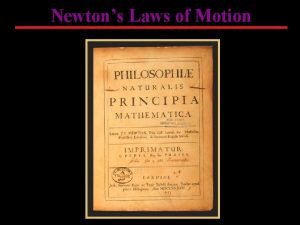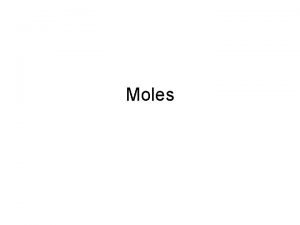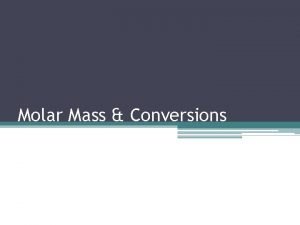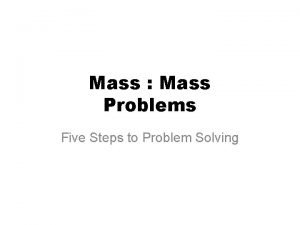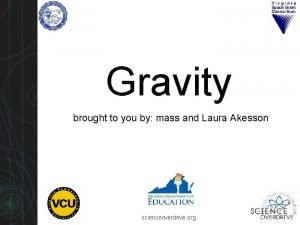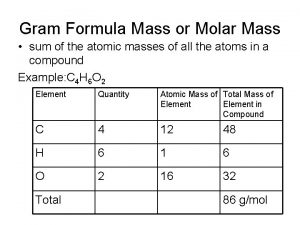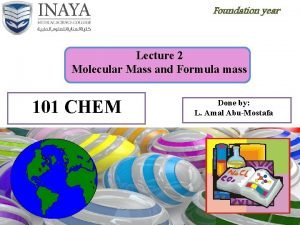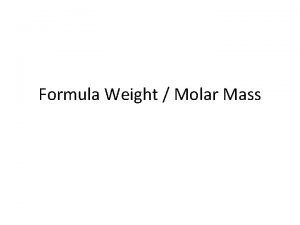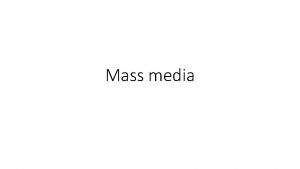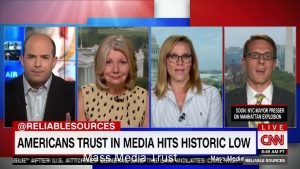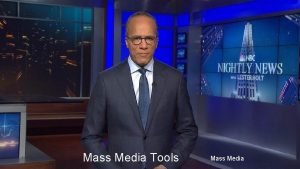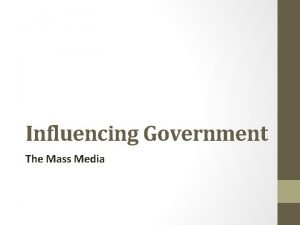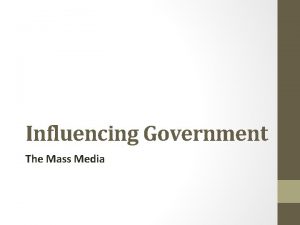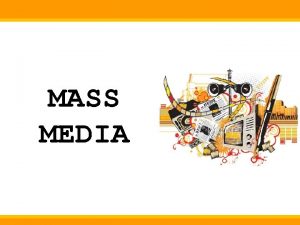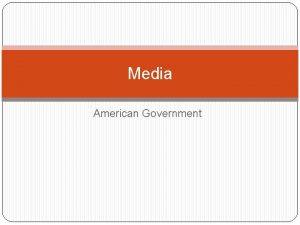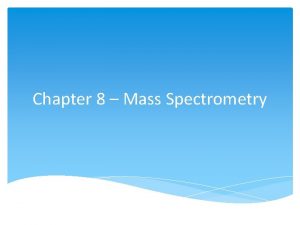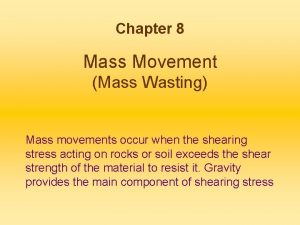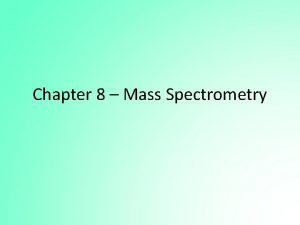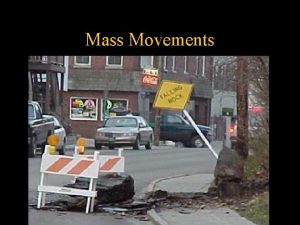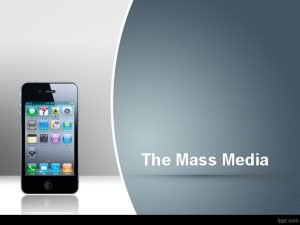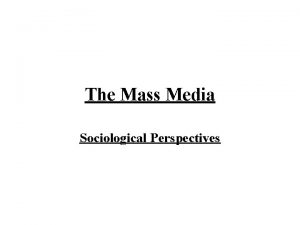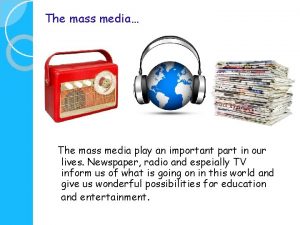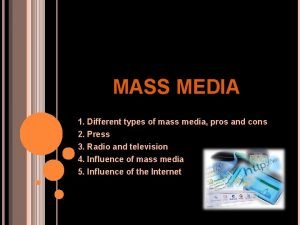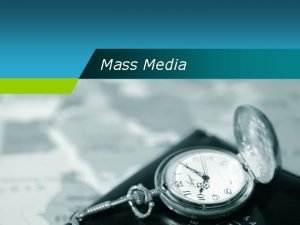Government Chapter 10 The media Media Mass media




















- Slides: 20

Government Chapter 10 The media

Media • Mass media denotes a section of the media specifically designed to reach a large audience. The term was coined in the 1920 s with the advent of nationwide radio networks, mass-circulation newspapers and magazines. However, some forms of mass media such as books and manuscripts had already been in use for centuries. • public.

media • Mass media includes Internet media (like blogs, message boards, podcasts, and video sharing) because individuals now have a means to exposure that is comparable in scale to that previously restricted to a select group of mass media producers.

media • The communications audience has been viewed by some commentators as forming a mass society with special characteristics, notably atomization or lack of social connections, which render it especially susceptible to the influence of modern massmedia techniques such as advertising and propaganda. • The term public media is less used and is defined as "media whose mission is to serve or engage a

News paper • A newspaper is a regularly scheduled publication containing news, information, and advertising. By 2007 there were 6580 daily newspapers in the world (including 1456 in the U. S. ) selling 395 million copies a day (55 million in the U. S). [1] The worldwide recession of 2008, combined with the rapid growth of web-based alternatives, caused a serious decline in advertising and circulation, as many papers closed or sharply retrenched operations. [2]

Circulation • USA Today Circulation: 2, 281, 831 • Wall Street Journal Circulation: 2, 070, 498 • New York Times. Circulation: 1, 121, 623

AGENDA -SETTING • The agenda-setting theory is theory that the mass-news media have a large influence on audiences by their choice of what stories to consider newsworthy and how much prominence and space to give them. [1]

Agenda-setting • Agenda-setting theory’s main postulate is salience transfer. Salience transfer is the ability of the mass media to transfer issues of importance from their mass media agendas to public agendas

SELECTIVE EXPOSURE • Selective exposure theory is a theory of communication, positing that individuals prefer exposure to arguments supporting their position over those supporting other positions, media consumers have more privileges to expose themselves to selected medium and media contents. People tend to engage in information that comforts and agrees with their own ideas and as a result, they avoid information that argues against their opinion

SELECTIVE PERCEPTION • Tendency to avoid information inconsistent with one’s beliefs & attitudes. Example: Attention to political ads. Can be counteracted by three factors: Perceived usefulness of information. Perceived norm of fairness. Curiosity/interest value of information. Application: Persuading a hostile audience.

SELECTIVE PRECEPTION • Example • After buying something, when we see it elsewhere, we are torn between checking the price to confirm we have bought a bargain and the fear that we will find that we could have bought it cheaper. • So what?

SELECTIVE PRECEPTION • Using it • When you have persuaded somebody, deflect them from situations where they might feel that they have made the wrong decision. If they do face this dissonance, talk up their decision so they will naturally move away from the distraction.

NATIONAL NEWSPAPER • US Newspapers • USA Today – Circulation: 2, 281, 831 • Wall Street Journal – Circulation: 2, 070, 498 • New York Times

MEDIA CONGLOMERATES • A media conglomerate describes companies that own large numbers of companies in various mass media such as television, radio, publishing, movies, and the Internet. It is also referred to as media institutions and media groups.

MEDIA CONGLOMERATES • As of 2009, in terms of revenue, The Walt Disney Company is the world's largest media conglomerate, with Time Warner and News Corporation ranking second and third respectively[

KENNEDY/ NIXON DEBATES • WASHINGTON (CNN) -- The first televised debate between presidential candidates, which took place 45 years ago Monday, not only had a major effect on the 1960 election, it changed America politics for good.

KENNEDY/ NIXON DEBATES • The candidates in 1960 were Democratic Sen. John F. Kennedy and Republican Vice President Richard Nixon, and the debate turned, not on what they said about the Cold War or civil rights. • In fact it didn't turn on what they said at all. The key factor was makeup.

KENNEDY/ NIXON DEBATES • Nixon arrived at the CBS station in Chicago after a hard day's campaigningspeech to a labor union and so on. • He was tired, still not fully recovered from an infected knee.

KENNEDY/ NIXON DEBATES • He declined CBS's offer of makeup, but one of his staff dabbed his face with something called Lazy Shave, which was supposed to hide his five o'clock shadow

KENNEDY/ NIXON DEBATES • Kennedy, in contrast, had spent he day relaxing, fielding practice questions. He had a California tan, though an aide told Hewitt later that Kennedy wore a little makeup, too. • Better than Lazy Shave, whatever it was. • The contrast was dramatic. Nixon, blotchy and nervous, Kennedy tanned and trim.
 National government vs federal government
National government vs federal government Chapter 8 mass media and public opinion worksheet answers
Chapter 8 mass media and public opinion worksheet answers Chapter 8 mass media and public opinion worksheet answers
Chapter 8 mass media and public opinion worksheet answers Chapter 8 section 3 the mass media
Chapter 8 section 3 the mass media Limiting reactant definition
Limiting reactant definition Mass number vs atomic mass
Mass number vs atomic mass Relative atomic mass of beryllium
Relative atomic mass of beryllium Percentage by mass formula
Percentage by mass formula Inertial mass vs gravitational mass
Inertial mass vs gravitational mass Grams to mols
Grams to mols Amu vs molar mass
Amu vs molar mass Mass/molar mass
Mass/molar mass The mole bridge
The mole bridge Read pp
Read pp Mass/mass problems
Mass/mass problems Differentiate between atomic number and mass number
Differentiate between atomic number and mass number Gravitational mass vs inertial mass
Gravitational mass vs inertial mass Molar mass table
Molar mass table Cl- molar mass
Cl- molar mass What is atomicity
What is atomicity Mass number formula
Mass number formula
